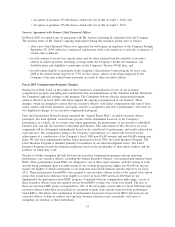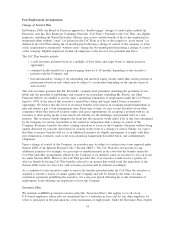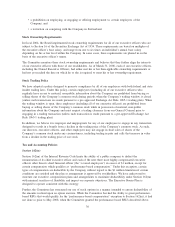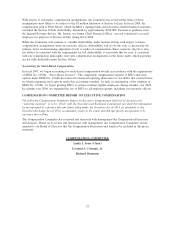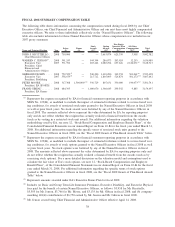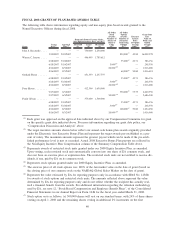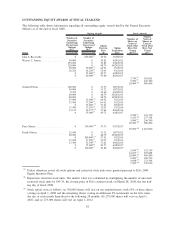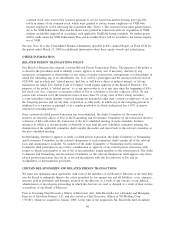Electronic Arts 2008 Annual Report Download - page 50
Download and view the complete annual report
Please find page 50 of the 2008 Electronic Arts annual report below. You can navigate through the pages in the report by either clicking on the pages listed below, or by using the keyword search tool below to find specific information within the annual report.• a prohibition on employing, or engaging or offering employment to, certain employees of the
Company; and
• a restriction on competing with the Company in Switzerland.
Stock Ownership Requirements
In fiscal 2004, the Board implemented stock ownership requirements for all of our executive officers who are
subject to Section 16 of the Securities Exchange Act of 1934. These requirements are based on multiples of
the executive officer’s base salary, and range from one to six times an individual’s annual base salary
depending on his or her level within the Company. In some cases, these requirements are phased in on the
basis of the executive officer’s tenure.
The Committee monitors these stock ownership requirements and believes that they further align the interests
of our executive officers with those of our stockholders. As of March 31, 2008, each of our executive officers,
including the Named Executive Officers, had either met his or her then-applicable ownership requirements or
had not yet reached the date on which he or she is required to meet his or her ownership requirement.
Stock Trading Policy
We have adopted a policy designed to promote compliance by all of our employees with both federal and state
insider trading laws. Under this policy, certain employees (including all of our executive officers) who
regularly have access to material, non-public information about the Company are prohibited from buying or
selling shares of the Company’s common stock during periods when the Company’s trading window is closed
(unless such transactions are made pursuant to a pre-approved Exchange Act Rule 10b5-1 trading plan). When
the trading window is open, these employees (including all of our executive officers) are prohibited from
buying or selling shares of the Company’s common stock while in possession of material, non-public
information about the Company and must request a trading clearance from our General Counsel prior to
engaging in a trading transaction (unless such transaction is made pursuant to a pre-approved Exchange Act
Rule 10b5-1 trading plan).
In addition, we believe it is improper and inappropriate for any of our employees to engage in any transaction
designed to result in a benefit from a decline in the trading price of the Company’s common stock. As such,
our directors, executive officers, and other employees may not engage in short sales of shares of the
Company’s common stock under any circumstances, including trading in puts and calls that increase in value
from a decline in the trading price of our stock.
Tax and Accounting Policies
Section 162(m)
Section 162(m) of the Internal Revenue Code limits the ability of a public company to deduct the
remuneration of its chief executive officer and each of the next three most highly compensated executive
officers other than its chief financial officer (the “covered employees”) in excess of $1 million, except for
certain compensation which qualifies as “performance-based compensation.” Under this exception, certain
types of compensation are deductible by the Company without regard to the $1 million limitation if certain
conditions are satisfied and the plan or arrangement is approved by stockholders. We have endeavored to
structure our executive compensation plans and arrangements to maximize deductibility under Section 162(m)
with minimal sacrifices of flexibility and impact on corporate objectives. The Executive Bonus Plan is
designed to operate consistent with this strategy.
Further, the Committee has structured our use of stock options in a manner intended to ensure deductibility of
the amounts realized upon an option exercise. While the Committee has had the ability to grant performance-
based RSUs that would qualify for the “performance-based compensation” exception to Section 162(m), it had
not done so prior to May 2008, when the Committee granted the performance-based RSUs described above.
36









